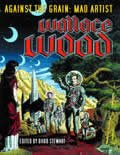Chester Gould's The Mole of the early 1940s returns in April when IDW publishes Volume Seven of The Complete Dick Tracy (1941-42). A decade later, the character was the inspiration for Bill Elder and Harvey Kurtzman's Melvin Mole in Mad #2 (December 1952-January 1953). The story "Mole!" was one of the memorable creations of the early Mad, kick-starting the comic book and catapulting it into unexplored valleys obscured by clouds. For an illustrated review of Mad #2, see Eddie Hunter's Chicken Fat.
After one had read "Mole!" and Wally Wood's "Blobs!" (Mad #1), readers had to pick up #3 and #4 just to see what was erupting from the manhole covers at 225 Lafayette Street. What rough beast, its hour come round at last, was slouching towards Madison Avenue to be born? Dig, dig!
Labels: blobs, chester gould, dick tracy, elder, kurtzman, mole, nostril hair
Two Wally Wood self-portraits from two different stages of his life. In "The Jumper," from his Paratrooper days in the 1940s, the youthful Wood floats outside the picture plane. Decades later, he sketched the bar scene, evidently a mirror reflection, since he is holding the drink in his left hand. Note hint of Death figure waiting outside the door.
Labels: jumper, pencil, sketch, wood, wood chips
Control-click heading above to hear the St. Louis Harmony Chorus do the 20th Century Fox Fanfare. Then quickly enlarge image before music begins for our coolest audio-visual juxtaposition yet.
eBoy is a Berlin-based digital design collective (Steffen Sauerteig, Svend Smital and Kai Vermehr) which produces posters, illustrations and toys. This illustration was done for the Los Angeles Times Magazine. Compare the two groups behind stanchions at the red carpet, and you will see that the figures repeat.

Labels: academy awards, eboy, kodak, los angeles, oscars, sauerteig, smital, vermehr

"Owns Home Computer": 1981 report on KRON in San Francisco (which then had 3000 computers):
"Newspapers via CompuServe," one of many cyber footnotes at David Carlson's Online Timeline:
Labels: compuserve, death of newspapers, fred the computer, tandy, trs-80, videotex



Below is an excerpt from Adolfas Mekas' Hallelujah the Hills (1963), shown at the first New York Film Festival. The cinematography on Hallelujah the Hills was by Ed Emshwiller. During the time of the filming, Emshwiller painted this cover for the April 1963 issue of The Magazine of Fantasy & Science Fiction, illustrating a James White story, "Fast Trip," about a crew member who starves so another can remain strong enough to pilot the spacecraft. Anyone who knew Adolfas and Jonas Mekas back then instantly recognized them as the anguished astronauts. The painting played like an inside joke, since Adolfas always appeared quite healthy, while Jonas seemed somewhat undernourished.
Emshwiller's neighbor in Levittown was future Zippy cartoonist Bill Griffith. He painted the 13-year-old Griffith and his father into this issue of Original Science Fiction (September 1957).
Labels: emshwiller, fantasy, griffith, hallelujah the hills, james white, mekas, science fiction, zippy

Click for huge enlargement of orange/yellow-clad Gypsy Lou Webb in the French Quarter during the early 1960s with her artwork on wall at St. Peter and Royal Street. She was not identified in this c. 1960-61 postcard published by New Orleans' Post Card Specialties. Instead, the caption reads: "Street scene typical in the Vieux Carre, French Quarter of New Orleans, Louisiana. The iron lace balconies of the buildings on left are famous for their intricate design, in an area where wrought and cast iron work is the commonplace."


Behind one of the balconies, at 618 Rue Ursulines, was Loujon Press where Gypsy Lou and Jon Webb published such writers as Charles Bukowski, William Burroughs, Gregory Corso, Lawrence Ferlinghetti, Jack Kerouac and Colin Wilson. Go to Edwin Hunter's Chicken Fat to see a photo of Gypsy Lou that Hunter took in January 1965. As he explains, she also sold Harvey Kurtzman's Trump alongside the poetry publications.
Review of the Jeff Weddle book and the Wayne Ewing documentary by Flickhead. University of Alabama lecture on literary magazines by Jeff Weddle (December 4, 2007). Also listen to Weddle reading his own poetry.

Labels: ewing, flickhead, french quarter, gypsy lou, kerouac, kurtzman, loujon, muffuletta, new orleans, the outsider, trump, university of mississippi press, weddle
Harvey Dinnerstein is represented by the Frey Norris Gallery in San Francisco. His paintings are collected in the new book, Underground Together: The Life and Art of Harvey Dinnerstein (Chronicle Books, 2008).
Labels: art, fine art, frey norris gallery, gallery, harvey dinnerstein, painting, sic transit gloria mundi, subway, transit authority, underground
eBoy is a Berlin-based design collective (Steffen Sauerteig, Svend Smital and Kai Vermehr) which produces posters, illustrations and toys.



Labels: animation, bouncing ball, car-tune, fleischer, joy hodges, sing-along, song

 In his blog Four-Eyes, Neufeld comments:
In his blog Four-Eyes, Neufeld comments:Labels: biloxi, graphic novel, josh neufeld, katrina, new orleans, surge









